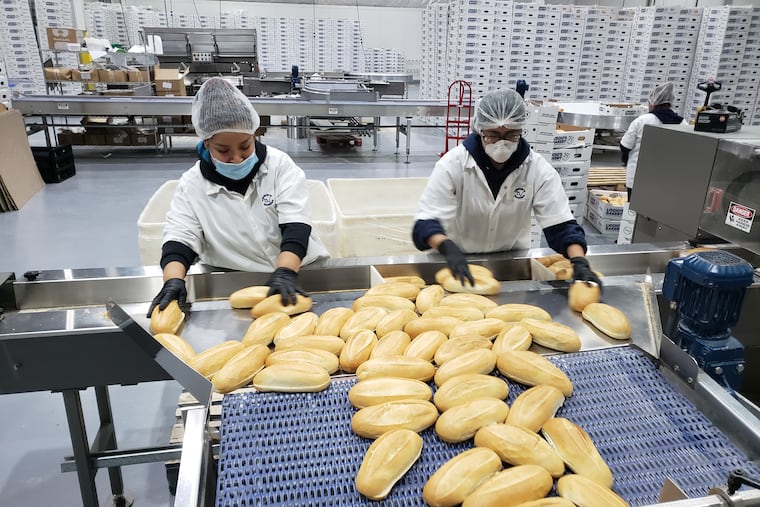A South Jersey bakery is putting hoagie-roll makers back to work thanks to a coronavirus PPP loan
Liscio’s Italian Bakery competes with Amoroso’s and other area bakers supplying hoagie and cheesesteak shops, restaurants, and grocers with fresh rolls for the region’s distinctive sandwiches.

Charles “Chad” Vilotti and James Liscio, partners at the 400-worker Liscio’s Italian Bakery Inc. in Glassboro, are among the first Philadelphia-area firms to collect cash from a “forgivable” coronavirus economic relief loan through the Small Business Administration.
“We like to say that ‘banks are these places that give you umbrellas when it stops raining,’" Vilotti joked after the bank wired the loan proceeds into Liscio’s account late last week so he could start calling back laid-off workers. But with this taxpayer-backed program, the bakery’s longtime bankers at TD Bank "gave us an umbrella, almost at the first sign of rain.”
The Paycheck Protection Program, which began April 3, was touted by the White House and Congress as a rapid solution to the coronavirus-fueled economic collapse. It was designed to help firms with fewer than 500 employees keep paying their people despite the sweeping closures of businesses.
But business owners desperate for cash found found the response far from rapid. Banks soon reported delays obtaining and applying SBA guidelines before they would wire money to borrowers’ accounts under the hastily assembled program.
This year started strong at Liscio’s, which competes with Amoroso’s and other area bakers supplying hoagie and cheesesteak shops, restaurants, and grocers with fresh rolls for the region’s distinctive sandwiches.
“We were in the midst of one of our best quarters, as far as sales,” Vilotti said. “We were 400 people when this thing hit.”
But then restrictions to stem the spread of the virus in New Jersey, Pennsylvania, and Delaware shut dining rooms at the restaurants and shops that Liscio’s serves. Owners couldn’t say when they would reopen. Vilotti had to lay off dozens.
New Jersey officials assured Vilotti that the bakery could stay open “to keep the flow of food going,” and promised not to block workers commuting in, so long as the company could operate under social distancing rules.
Liscio’s cut back production and began implementing anti-contagion practices, such as Plexiglas shields, before they were mandated. “And we gave a lot of bonuses,'" Vilotti said. "I was pleasantly surprised — our people wanted to come in. Of course they needed the money. But they were also feeling it was their duty. It’s amazing to see the character of the employees.”
The company had more than doubled its staff since the Glassboro bakery opened three years ago in the former ADM Cocoa plant on Ellis Mill Road after the state agreed to tax incentives. Liscio’s also runs three retail stores.
The closure or move to takeout for its hoagie shop customers was a blow, but not a fatal one for Liscio’s. Mom-and-pop sandwich stores closed or cut back to takeout business. A bar-service vendor cut orders 60%. “We lost the Wells Fargo Center when they closed and all the colleges when they sent the kids home,” Vilotti said. His own three sons are all home, two from college, “and they are cooking up a storm,” he said.
“We’re blessed with a diverse customer base between our mom-and-pop sandwich makers, our grocers, and we get some frozen business, private-label, outside the area,” Vilotti said.
The PPP program, so far, seems to be working best for businesses that already borrow from lenders with experience in the SBA’s regular loan-guarantee programs. TD is among the biggest SBA lenders in the East Coast states where the Canada-based bank has branches. Liscio’s has been a customer since TD bought Marlton-based Commerce Bank in 2007.
Vilotti said his TD lenders — a team of three, Greg Cieslik, Greg Carlisle and Rob Curley — reached out even before the PPP program was approved as part of the coronavirus stimulus program late last month.
“They had been giving us some information of what was coming down the pike,” he said. “They said they were going to set aside any interest payments, on any outstanding loans, during this time of uncertainty. We gave a big sigh of relief.”
PPP offers “forgivable” loans up to $10 million, so long as the proceeds are used to keep workers employed and to pay occupancy costs such as utilities and rent or regular mortgage payments.
But details were confusing — especially on social media, “where people’s ideas and understanding about this program kept changing,” Vilotti said.
By April 6, the day SBA said it would start accepting applications from banks, TD had an online portal ready to collect business, payroll, and tax information from current business customers such as Liscio’s. (Like most banks, TD, a Canadian-owner company with offices in Cherry Hill, has not been accepting applications from non-customers.)
“My controller and I got in the office early that Tuesday and we jumped on the portal right away,” Vilotti said. “We were able to complete the application within two hours.” The Liscio application, based on its monthly payroll, was for a little more than one-quarter of the $10 million limit.
By last Friday, April 10, “we got the wire."
“We have a great safety net now,” Vilotti said. "We are developing a schedule to get the people we laid off back to work.”